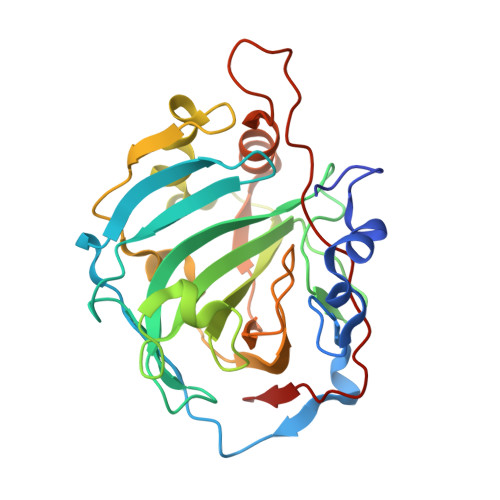Intrinsic thermodynamics of 4-substituted-2,3,5,6-tetrafluorobenzenesulfonamide binding to carbonic anhydrases by isothermal titration calorimetry.
Zubriene, A., Smirnoviene, J., Smirnov, A., Morkunaite, V., Michailoviene, V., Jachno, J., Juozapaitiene, V., Norvaisas, P., Manakova, E., Grazulis, S., Matulis, D.(2015) Biophys Chem 205: 51-65
- PubMed: 26079542
- DOI: https://doi.org/10.1016/j.bpc.2015.05.009
- Primary Citation of Related Structures:
4WR7, 4WUP, 4WUQ, 4WW6, 4WW8 - PubMed Abstract:
Para substituted tetrafluorobenzenesulfonamides bind to carbonic anhydrases (CAs) extremely tightly and exhibit some of the strongest known protein-small ligand interactions, reaching an intrinsic affinity of 2 pM as determined by displacement isothermal titration calorimetry (ITC). The enthalpy and entropy of binding to five CA isoforms were measured by ITC in two buffers of different protonation enthalpies. The pKa values of compound sulfonamide groups were measured potentiometrically and spectrophotometrically, and enthalpies of protonation were measured by ITC in order to evaluate the proton linkage contributions to the observed binding thermodynamics. Intrinsic means the affinity of a sulfonamide anion for the Zn bound water form of CAs. Fluorination of the benzene ring significantly enhanced the observed affinities as it increased the fraction of deprotonated ligand while having little impact on intrinsic affinities. Intrinsic enthalpy contributions to the binding affinity were dominant over entropy and were more exothermic for CA I than for other CA isoforms. Thermodynamic measurements together with the X-ray crystallographic structures of protein-ligand complexes enabled analysis of structure-activity relationships in this enzyme ligand system.
Organizational Affiliation:
Department of Biothermodynamics and Drug Design, Institute of Biotechnology, Vilnius University, Graičiūno 8, Vilnius LT-02241, Lithuania. Electronic address: astzu@ibt.lt.


















